Are you someone who always puts the needs of others before your own in a relationship? Do you often find yourself going to great lengths to please your partner, even if it means sacrificing your happiness? If so, you may be fall into the category of people pleasers in relationships.
People pleasers in relationships often exhibit a pattern of self-sacrifice, constantly prioritizing their partner’s needs and desires over their own. This pattern of self-sacrifice can lead to feelings of resentment and dissatisfaction.
However, it is important to note that being a people pleaser in relationships is not a healthy or sustainable dynamic. Individuals must establish healthier patterns of communication and prioritize their own needs and well-being to foster a more balanced and fulfilling relationship.
This article explores the effects of people pleasers in relationships and the impact this behavior can have on their overall well-being.
Who Is a People Pleaser?
People pleasing in relationships often describes individuals who are generally seen as helpful and kind by others. They offer assistance with tasks or studying when needed. However, if you recognize yourself in this description, you might be a people pleaser.
A people pleaser in a relationship is someone who always tries to make their partner happy, even if it means ignoring their own needs. While their intentions are good, but constantly putting their partner’s wishes first can make them lose their sense of self and personal boundaries.
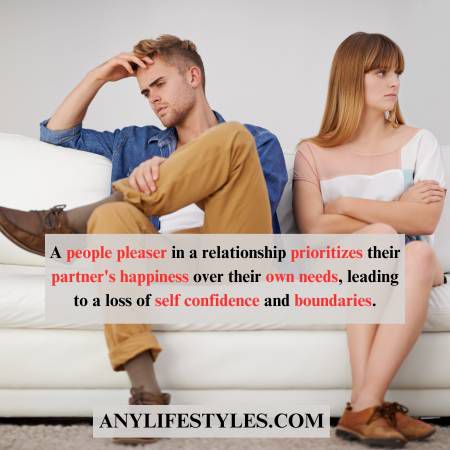
People pleasers may find it challenging to assert themselves or express their true feelings, fearing that doing so might disappoint their partner. Understanding the dynamics of people pleasing in relationships is crucial for achieving a healthier balance between relationships.
Why One Can Become a People Pleaser?
Becoming a people pleaser often traces back to our early family experiences. Unhealthy family dynamics tend to be rigid, with numerous unspoken rules dictating how family members should interact with one another and the outside world.
Many people pleasers begin as “parent pleasers,” where they try to win the affection and attention of emotionally distant parents. For instance, a child with a depressed parent might invest a lot of emotional energy in taking care of the parent instead of receiving care themselves.
At first, the child may receive approval and attention through this caregiving, but with time, they come to realize that this dynamic doesn’t fulfill their own developmental needs. To maintain their parent’s approval, they must continue being a “good child” and focus on their parent’s emotional needs.
In such families, they discourage authentic emotions and behaviors, and they emphasize appearing normal and okay to outsiders. Children in these families are often told to “put on a happy face” regardless of their true feelings.
Growing up with an emotionally unavailable or narcissistic parent teaches children that the only way to earn acceptance is through people-pleasing behaviors. Consequently, in adulthood, people pleasers tend to shoulder the blame for any problem that arises to preserve the love and approval of others.
The Consequences of People Pleasing in Relationships?
The impact of people pleasing on relationships is a complex issue with significant consequences. While individuals who tend to please people generally have good intentions, their behavior can create problems in their relationships.
Firstly, it often leads to a lack of personal boundaries. People pleasers struggle to establish and maintain healthy limits, which can unintentionally let others take advantage of their accommodating nature. This can make them feel overwhelmed and unappreciated.
Moreover, people pleasers often hide their true feelings and desires to keep the peace in their relationships. This can make it difficult for partners to truly understand each other and can hinder emotional closeness and authenticity.
Always putting others’ needs first can lead to bottled-up feelings of anger and irritation. People who tend to please others might feel undervalued when their actions aren’t recognized, and their wants are continuously overlooked.
6 Signs Of People Pleasers
Recognizing signs of people pleasers in relationships is the first step towards reclaiming your life for yourself. One prominent indicator of people pleasers in relationships is when individuals feel responsible for managing the emotions and reactions of others.
Below we are going to discuss some common signs of people pleasers in relationships:
1. Difficulty In Maintaining Boundaries:
People-pleasers often encounter challenges when it comes to setting boundaries in their relationships. Their natural inclination to prioritize the comfort and happiness of others can make it difficult for them to assert their own needs and limits.
They may fear that setting boundaries will lead to conflict or disappointment in their relationships, and as a result, they may find themselves constantly accommodating others at the expense of their well-being.
The challenge of setting and enforcing clear boundaries in relationships can result in feelings of frustration, exhaustion, and a sense of others taking advantage of them.
2. You Cannot Say No – People Pleasers in Relationships:
Saying no to requests in relationships can be tough for a lot of people, but it’s even harder for people who tend to please others all the time. People pleasers often feel really anxious or even physically uncomfortable when they have to turn down someone’s request.
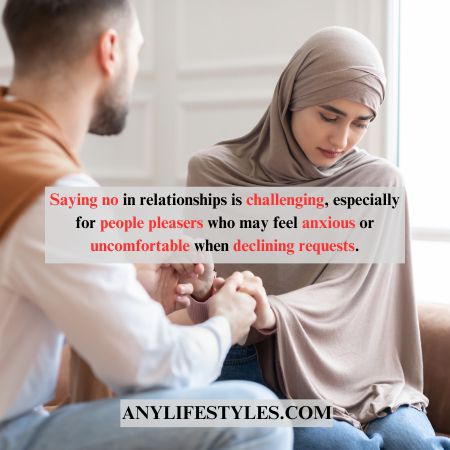
This intense discomfort can lead them to say yes even when the request is unreasonable or goes against their desires. Interestingly, many people-pleasers struggle to say no even to individuals they don’t particularly like.
They may find themselves doing favors for people they actively dislike simply because the act of saying no is so distressing to them.
3. Prioritizing Others More Than Yourself:
People pleasers in relationships tend to prioritize others’ needs and desires above their own. They often find themselves constantly thinking about how to make others happy and comfortable, sometimes to the detriment of their well-being.
This selfless approach to relationships can be admirable, but it can also lead to a pattern where the people pleaser neglects their own needs and sacrifices their happiness for the sake of others.
Striking a balance between caring for others and looking after oneself can be a significant challenge for those who tend to think about others more than themselves in their relationships.
4. You Don’t Have Time To Yourself:
People pleasers in relationships often struggle to carve out time for themselves. They are so dedicated to accommodating others and ensuring their happiness that they frequently neglect their self-care and personal time.
This can result in a cycle of constantly putting the needs of others ahead of their own, leaving them with limited opportunities to recharge, reflect, and nurture their well-being.
Balancing the needs of others with self-care is a crucial challenge for people-pleasers in relationships, as taking time for oneself is essential for maintaining emotional and mental health.
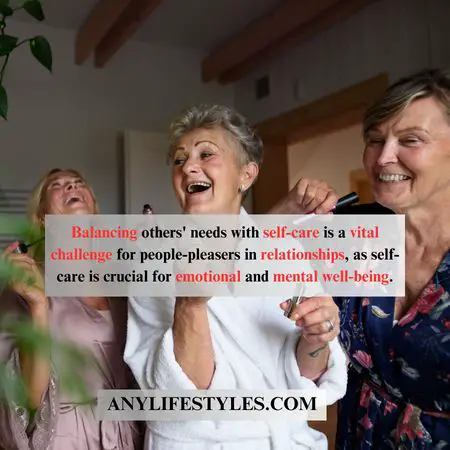
5. You Blame Yourself For Others Mistake:
People-pleasers tend to blame themselves for others’ mistakes to maintain peace and avoid conflicts. This habit can damage their self-esteem and create emotional challenges. Distinguishing between their responsibility and others’ faults is a struggle for people-pleasers in relationships.
This pattern of self-blame can damage their mental health, and well-being, as it reinforces a sense of unwarranted guilt and can lead to emotional exhaustion.
Learning to differentiate between their responsibility and that of others is a significant challenge for people-pleasers in relationships.
6. You Need Constant Approval:
People pleasers frequently experience significant concerns about facing rejection. These worries drive them to take actions to ensure that people like them and do not reject them. They also really want to feel needed because they think it will make people like them more.
People pleasers thrive on getting approval from others. It’s normal to want approval from people who matter to us, but for people-pleasers, not getting approval can make them feel very empty. They feel like they have to please everyone they meet, even people they don’t know.
How To Stop Being A People Pleaser In Relationships?
To stop being a people pleaser, you can start by recognizing when you tend to put others’ needs before your own. Take care of yourself both physically and mentally, and remember it’s not selfish to do so.
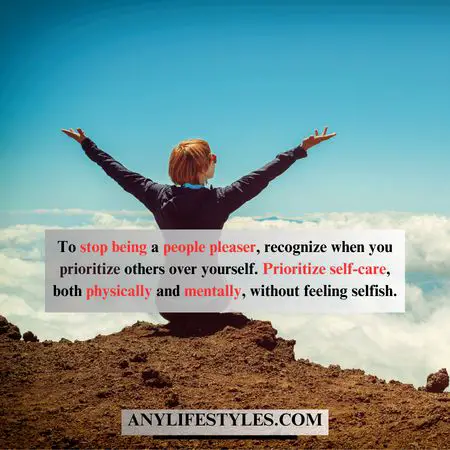
If it’s tough to break this habit, consider seeking support from family, or a therapist. Ultimately, it’s important to prioritize your own needs and feelings while managing healthy relationships with others.
Below, we are going to share some tips to help you begin your journey to stop people-pleasing and have better relationships.
1. Learn To Say NO:
Breaking the habit of pleasing others can be tough. Sometimes, it’s so ingrained that you need to remind yourself that it’s okay to say no. You have the right to put yourself first and say no to things you don’t want to do or that are unreasonable.
The important thing to remember is that saying “no” when you really mean it is not selfish; it’s self care. Try not to give excuses or explanations when you say no. While they can be helpful at first, the goal is to firmly say no without softening your response or making excuses.
2. Set Healthy Boundaries – People Pleasers in Relationships:
Setting boundaries in relationships is often discussed, but it can be challenging, especially for people-pleasers. When establishing boundaries, start by figuring out where they should be and what they should be.
Ignoring your boundaries may temporarily reduce anxiety because you fear rejection, but it’s unlikely to leave you feeling proud or satisfied. Setting boundaries can be intimidating. People-pleasers often overlook the boundaries they need to establish in their lives.
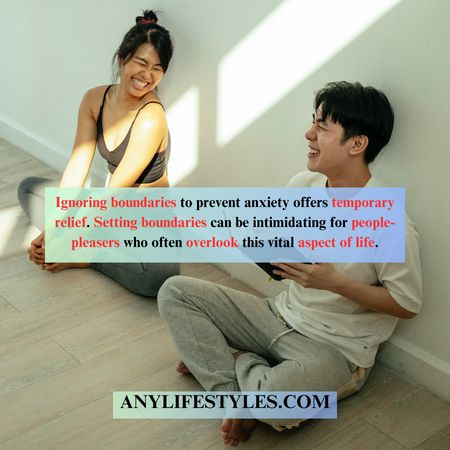
3. Prioritize Yourself:
Taking time for yourself and being alone is crucial for both your mental and physical well-being. Many individuals fear solitude, worrying it will lead to loneliness, boredom, or anxiety. However, these concerns stem from the hyper-connected world of modern society.
When you are alone, you have the freedom to focus on yourself, without the need to consider others’ opinions or expectations. Spending time in solitude offers an opportunity for self-reflection, allowing you to better understand your thoughts, emotions, and needs.
4. Accept Yourself For Who You Are:
Self-acceptance involves recognizing your strengths and weaknesses and leveraging them to your advantage. When you genuinely accept yourself, others will eventually follow suit. When you give into people-pleasing, you disconnect from yourself, believing that your worth depends on others’ opinions.
Embracing your flaws can be challenging. The more time and energy you invest in trying to please others, the less you have for yourself and the things that truly matter to you. The way to break free from this cycle is to stop concerning yourself with what others think and fully embrace your authentic self.
Conclusion – People Pleasers In Relationships:
In conclusion, when it comes to relationships, it’s important for people pleasers to strike a balance between caring for others and themselves. This means setting boundaries, accepting imperfections, and taking care of their well-being.
It’s perfectly fine not to be perfect, and genuine connections thrive on honesty and mutual respect. By gradually letting go of the need to please everyone and valuing their own needs and feelings, people pleasers can build deeper and more meaningful relationships, leading to greater contentment and self-assurance.










